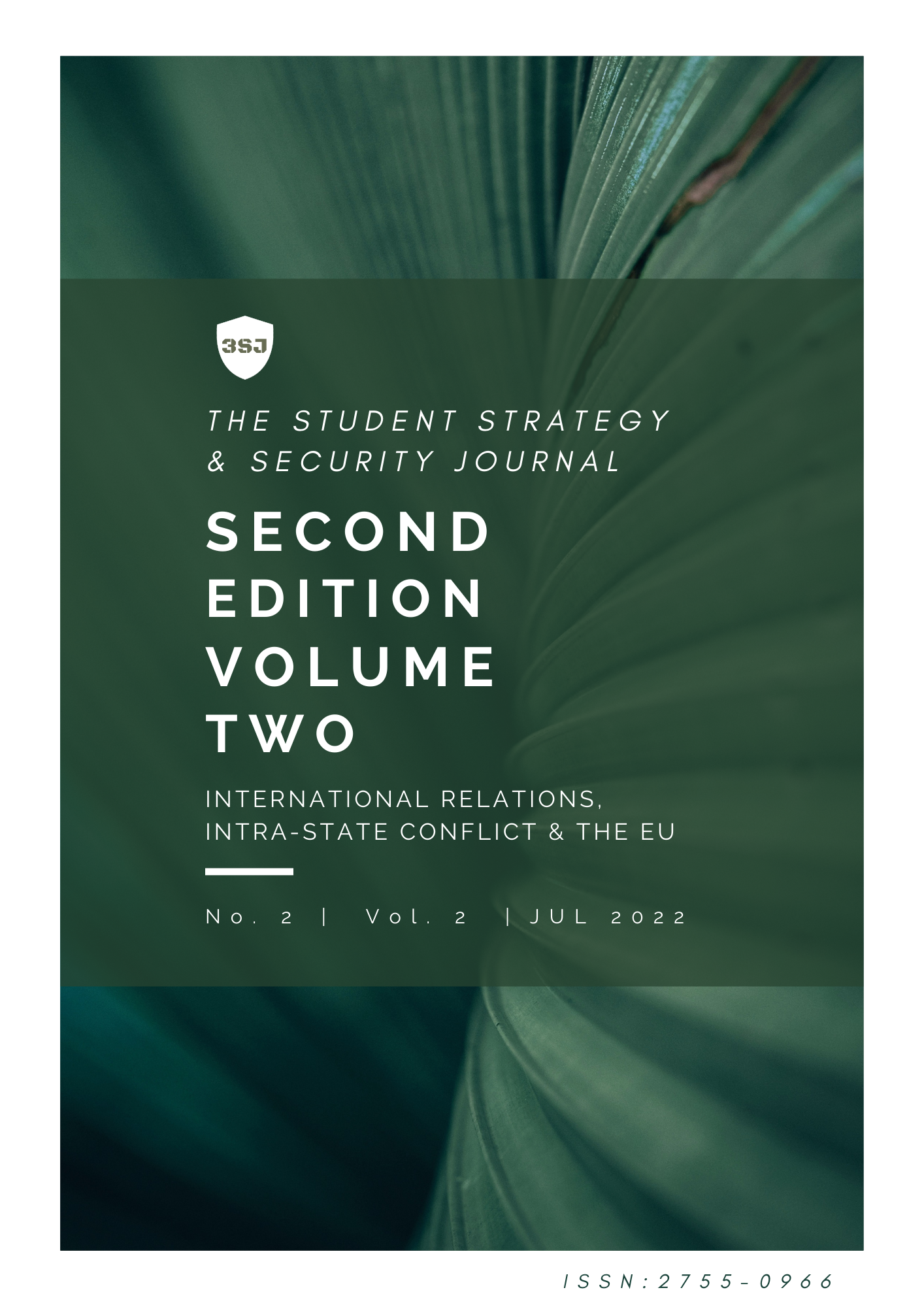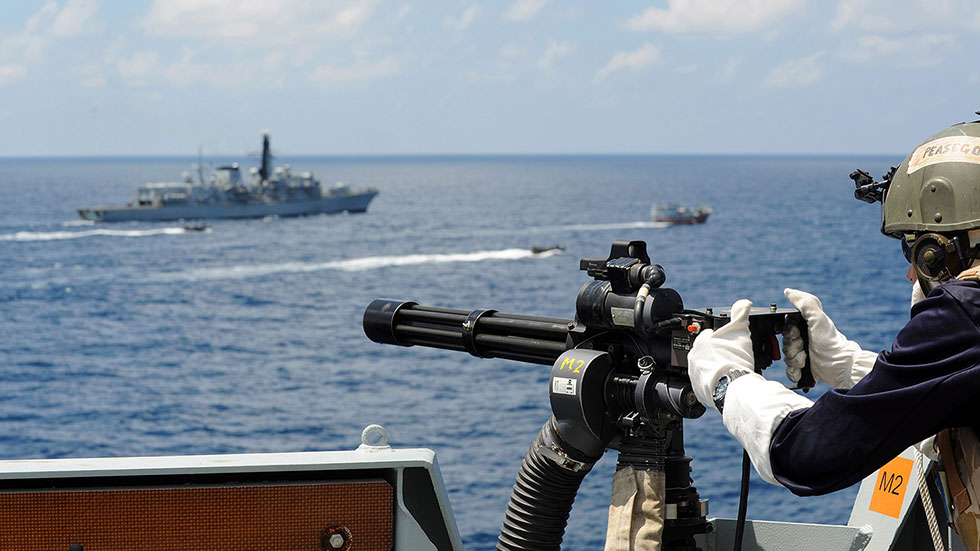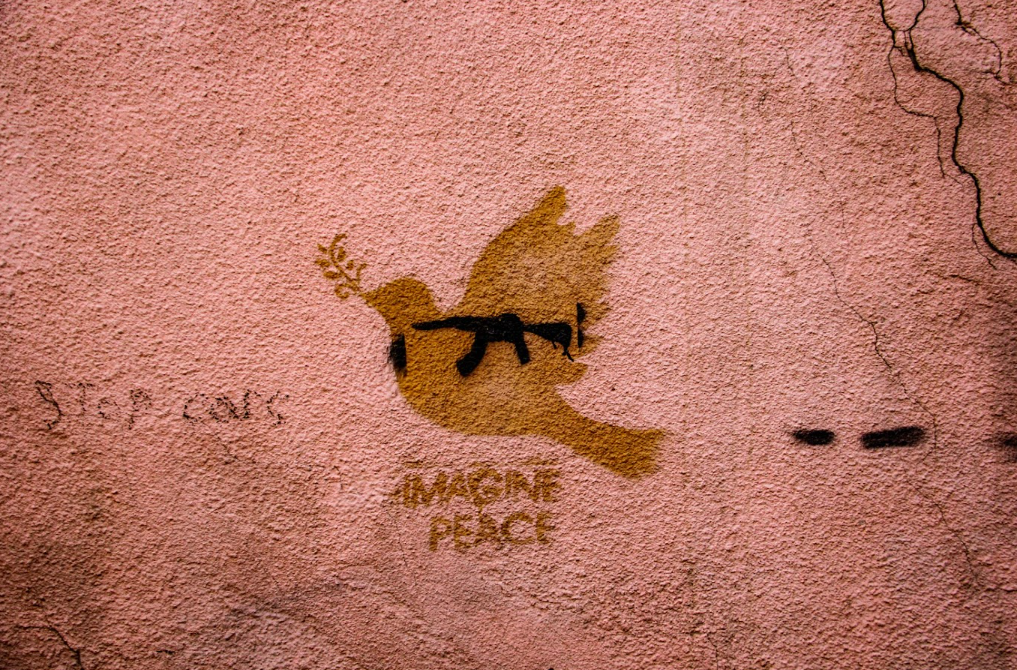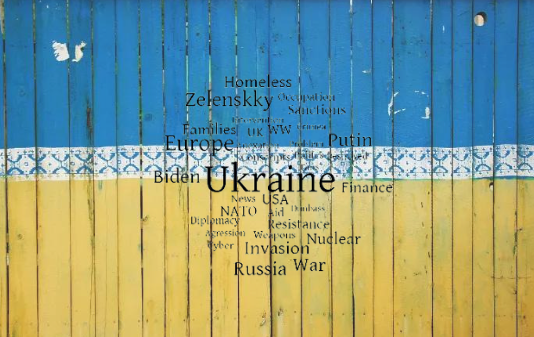SECOND EDITION
VOL TWOJuly 2022
Second Edition Volume Two
This issue explores non state actors, intra-state conflict and the EU, paying particular attention to the changing paradigms of IR. The issue begins by challenging existing theories of international relations by broadening them to maritime security and public opinion. With a specific focus on non-state actors, our contributors then investigate intra-state conflict, from Colombia to Syria. Moving from conflict to challenge, our contributors review the EU’s internal and external challenges in a European security climate that is getting all the more precarious. In our concluding section, 3SJ returns to its core issues of strategy and security by examining the role of women in the extreme right and applying novel methodologies to the Russia-Ukrainian conflict.
Pieter W.G. Zhao
Outsourcing Security at Sea: Constructivism and Private Maritime Security Companies
Between the 16th and the 19th centuries, the maritime warfare and security environment was dominated by non-state actors like mercantile companies and privateers. However, over time, such practices became outlawed as states gradually consolidated their monopoly of force over the maritime domain. Thus, the state monopoly of violence became the established international norm and armed non-state actors disappeared from the seas. This significantly changed after the sudden explosion of the Somali piracy epidemic of 2008 initiated a booming private maritime security industry. Within fifteen years, the use of private maritime security companies became a widely accepted practice within the maritime security environment. Yet, as these non-state actors are increasingly influencing the maritime security environment and the internationally established norms concerning the use of force at sea, questions arise concerning the explanatory power of mainstream IR theories like realism and liberalism in explaining the (re-)emergence and use of these modern privateers. This paper argues why constructivism provides an ideal framework to analyze both the return and use of armed non-state actors in the maritime security domain.
Keywords: Maritime Security, Maritime History, Private Maritime Security Companies, Constructivism, International Relations Theory
Ilias Koutroulis
Does public opinion affect foreign policy decision-making?
Under the influence of traditional theory, the discipline of International Relations has, for most of its history, paid little attention to societal factors when it comes to explaining international politics. Recognising the need for more multi-causal explanations, the field of Foreign Policy Analysis has attempted to introduce sub-state actors and individual-level variables. Research on public opinion’s impact on foreign policy has progressively increased over the past several decades, with findings suggesting that there is a significant correlation between the two. This paper aims to address some of the absolutist claims made regarding the nature of public opinion, before attempting to establish its links to foreign policy decision-making in various historical and contemporary settings. While this influence is evidently significant, it should be ultimately viewed as one of many variables in our attempt to analyse policy and politics.
Keywords: foreign policy, public opinion, pluralist model, elite model, democracies, war, Foreign Policy Analysis, International Relations
Vanessa Canola
El Conflicto Armado Interno de Colombia: An Analysis of Cycles of Conflict through Galtung’s Triangle of Violence
The present research aims at analyzing the ‘Conflicto armado interno de Colombia’, focusing on the perpetrators’ modus operandi and its repercussions for the victims through the lenses of Peace Research theory. The author specifically chose Johan Galtung’s triangle of violence, a conceptualization of the three dimensions of conflict, namely direct, structural and cultural violence. The paper’s ultimate goal is to understand how violence affected Colombia’s stability and its path toward peace from the assassination of the presidential candidate Jorge Gaitán (Labor Minister from 1943 to 1944), that occurred in 1948 during the electoral campaign, to today. The analysis aims to demonstrate that a majority of violent acts fall into the category described by Galtung as ‘direct violence’, where a clear linkage between the perpetrators and the victims is clear. Addressing the second dimension, it is possible to pinpoint children as the main victim of ‘structural violence’. Notwithstanding women and minorities being injured parties as well, the analysis demonstrates how ‘cultural violence’ affects this category in a different way, especially referring to the patriarchal structure of family dynamics in the country. The conclusion highlights that this paper focuses mainly on three precise aspects that affected (and affect) the Républica de Colombia, namely armed confrontations, child recruitment, and gender-based violence, leaving the doors open for further research, especially concerning displacement and other manifestations of structural and cultural violence.
Keywords: direct violence, structural violence, cultural violence, Colombia, guerrillas, paramilitary, drug lords, gangs, child soldiers, gender-based violence.
Christopher Meechan
Key Drivers for Strategy Adoption by Non-State Actors in Intra-State Conflicts. A Comparative Analysis of FARC in Colombia and the Syrian Opposition
Non-state actors have been seen to adopt various forms of both violent and non-violent strategies in order to pursue their goals. Violent and non-violent strategies offer various tactics to compete and cooperate with the state to solve grievances. However, often the reasons for specific strategy adoption depend on state actions. If the state is to block access to the institutional apparatus, non-state actors are forced to adopt extra-institutional means. To analyse the decision-making process of non-state actors, this paper draws from a comparative case study approach as this allows the use of empirical evidence to identify key events. The cases selected for this investigation are the Revolutionary Armed Forces of Colombia (FARC) and the Syrian opposition. These movements have existed since 1964 and 2011 respectively, in this time these non-state actors have adapted their violent and non-violent strategies depending on various factors such as the actions of the incumbent state, potential for mobilisation and collective action, and the role of third-party actors in granting legitimacy and material support for non-state actors. The study concludes that for non-state actors to engage in sustained violent strategies three key variables must be positive; oppressive responses from the government, a degree of legitimacy afforded to a group either by international or domestic sources and a reliable supply of material resources.
Keywords: Non-State Actors, Strategy Adoption, FARC, Syrian Opposition, Non-Violent Strategies, Collective Action, Mobilisation, Third-Party Actors
Alexander C. Olteanu
The Hierarchy and the Network: Re-casting the EU’s democratic deficit dilemma beyond the intergovernmentalist-integrationist debate
Theories of global governance have significant implications on how institutional design challenges are resolved in specific circumstances. This is particularly the case for supranational constitutionalising polities like the EU that attempt to develop some measure of direct democratic legitimacy above the sovereign state level. This paper focuses on how one’s analysis of the EU’s apparent democratic deficit varies depending on the analytical lens one chooses to employ. Focusing on the European Union’s Direct Citizens’ Initiative (‘DCI’) as an adaptive constitutional mechanism and using Michael Zürn’s Global Order approach as an analytical lens, it will argue that strategic transnational democratic activism deployed across Europe can transcend the clashing perspectives of the democratic deficit dilemma emerging from the long-standing and iterative intergovernmentalist-integrationist debate. The first section of this paper will investigate what it describes as the double dialectics of the EU’s legitimacy crisis debates, focusing on the explanatory theoretical lenses favoured by the historic participants in this controversy, which have shaped public perceptions of the EU at least since former British Prime Minister Margaret Thatcher’s famous 1988 Eurosceptic Bruges speech. The second section will deploy the normative and practical power of what Kathleen McNamara calls the EU’s “cultural infrastructure of governance” to substantiate the core of this paper’s thesis regarding the immanent potential of grassroots participative transnational movements to accelerate a radical shift in the EU’s paradigm of governance from today’s Hierarchic Sovereignty model to tomorrow’s Network Connexity design. The empirical evidence is provided by a process tracing approach to the case study of the Federal Union of European Nationalities’ (‘FUEN’) Minority SafePack Initiative (‘MSPI’).
Key words: ECJ – EU Commission – European Union – FUEN – Global politics – integrationism – intergovernmentalism– legitimacy crisis– minorities’ rights – MSPI – Polycracy – Sovereignty.
Shaun Turner
Worm or Giant? What can we Expect from the EU as an International Actor in 2022
In 1991, the former Belgian Foreign Minister Mark Eyskens described the EU as “an economic giant, a political dwarf, and a military worm”. Much to the chagrin of EU institutional actors, this remark has stuck. Since then, considerable developments have made the EU a far more formidable actor on the global stage, but what type of actor and where its strengths and weaknesses lie is still a subject of debate. This paper will review the EU’s status as a global actor by looking at the metrics of power suggested by Eyskens in his remark, namely the extent of the EU’s military, economic/civilian, and normative power. The paper will analyse the subject by using different theoretical frames of international relations, making use of historical examples of each power component and relating these to contemporary examples. From this, it will be argued that the EU’s power is civilian-normative, due to being constrained by not possessing a formal military, and this will remain the case in the future. As an actor, therefore, we can expect the EU to continue its active role in exerting its influence in matters of global diplomacy and economics, with minor developments as an actor in terms of security.
Keywords: EU, Security, Power, Ukraine, Normative Power, Civilian Power
Clara Cotillas Torres
Women in Extreme Right Movements: Maternalism as a Survival and Recruitment Strategy of the Far-Right
Female presence and influence in Extreme-right movements (ERMs) has been a matter of fervent debates in terrorist studies. Nonetheless, women’s roles in ERMs have often been reduced to their compliance with traditional gender roles, within which women are depicted as an attribute to men who merely conceive them as wives, mothers or companions. Hence, this paper seeks to further analyse the impact of feminine presence within these groups, placing special emphasis in their role as mothers. This paper will thus expose that maternalism represents one of the vital and most effective tools that contribute to the survival and endurance of ERMs. Mothers are not passive entities within these groups. They should be regarded instead as indispensable agents for the social nuclei and prosperity of ERMs.
Keywords: Far-right, Gender, Motherhood, Extremism, Recruitment
Andrew Brosnan, Shaurya Malhotra, Fergus Jayes, Anoop Sabu, Peter Sylvester, Mathew Murphy
Social Media Sentiment Analysis of The Russia-Ukrainian Conflict Through Natural Language Processing: Towards a New Strategic Studies Methodology
This paper presents a new methodology in the repertoire of strategic studies practitioners. Social media users generate large amounts of raw data that could provide actionable information in advising decision-making within strategic studies, as evidenced by the high volumes of posts related to the Russia-Ukrainian conflict. However, this potential resource has yet to be leveraged within strategic studies and international relations. This paper outlines how natural language processing can be leveraged to enable social media sentiment analysis, a methodology already in use in a variety of fields to inform decision-making based on large amounts of social media data. As a proof of concept and to outline how the methodology has a low skill and financial barrier of entry, this paper presents five key performance indicators that have been analysed and visualised using natural language processing of over four thousand tweets, collected in the first four weeks of the Russian-Ukrainian conflict. As such, it presents the utility of natural language processing as a methodology for strategic studies practitioners.
Keywords: Natural Language Processing, Social Media Sentiment Analysis, Strategic Studies, Russian-Ukrainian Conflict
Contact us
Become a contributor









